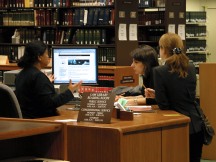Over the years, I have discovered a few of what I call “hidden search tricks and tips.” Some are specific to a particular search engine. Others are broadly applicable to be used just about anywhere, including within Word and other word processors. Here’s some of the most useful:
Defining Terms
Did you know that if you type <define “insert word here”> into Google, the first result on the page will be the definition of the typed word? Desire more information about the word? Click on the arrow at the bottom. It will display its origins, use of time, and a translation option. As an alternate option, switch the word “define” with either synonym or antonym to have Google locate those results instead.
Switching to Bing, the same search can be ran and it will bring up the definitions, synonyms, and a sound recording of the word.
Site Search
Ever encountered a website you wish to search, but no search box is available? Instead of manually scanning pages and pages of results, create your own custom search. Here’s how. On your desired search engine, type <site:”insert website link” and “insert search terms”> (or use parentheses and quotes per my advanced search techniques post for multiple terms on a site). This is one of my favorite techniques.
Search Engine as a Calculator
Don’t have a calculator handy but you are on the computer? Don’t wish to waste time going to the calculator in accessories? Just type the equation in Google or Bing and hit enter. The first result will be your answer. This trick also works for converting measurements and currencies as well.
Control F
You might have known that hitting Control F on your keyboard brings up a search box for within the document. This works regardless of browser; Word, PowerPoint, Excel, and equivalents; PDF files; etc. However, did you know that if you highlight text then click Control F that is automatically fills in the search box for you? Yep, saves a step!
Weather on Search Engines
Another hidden Google trick. If you type <weather “insert location here”>, the search engine will bring up a weather forecast for the area at the top of the results. Included information includes current temperature and weather, a graph of the hourly temperature forecast, an eight-day preview, and details about perception chances. The graph can also be changed to display precipitation changes and wind speed and direction instead.
Looking now at Bing, the same search will work. However, the results are different (and less detailed). You will see the current temperature and forecast plus a five-day preview.
While this doesn’t replace something like Accuweather, The Weather Channel, or a local news station for more in-depth detail, the quick preview is useful.
Events Times on Google
- Type simply <time> into the search box for the local time according to the atomic clock. This also works on Bing.
- Type <your flight number> and see information about that flight.
- Type <movies “your location”> and see a list of movie times for the nearest theater(s). Also links to previews and provides a map of nearby theater(s).
Because I seldom see anyone using Yahoo or other search engines anymore, I opted not to test these tricks and tips on them. However, feel free to try and let me know how they work. Google and Bing are the most popular search engines and are also the ones directing most traffic to this blog, which serves as another reason I only tested those two. Also, please feel free to share any additional tips and tricks you might know. Those can always benefit readers!





Type a UPS tracking number into the google search box, and pronto, you can track your package. Works with Fed-Ex, too. Not really a search, but cool. And fast.
Thanks for the additonal tricks!